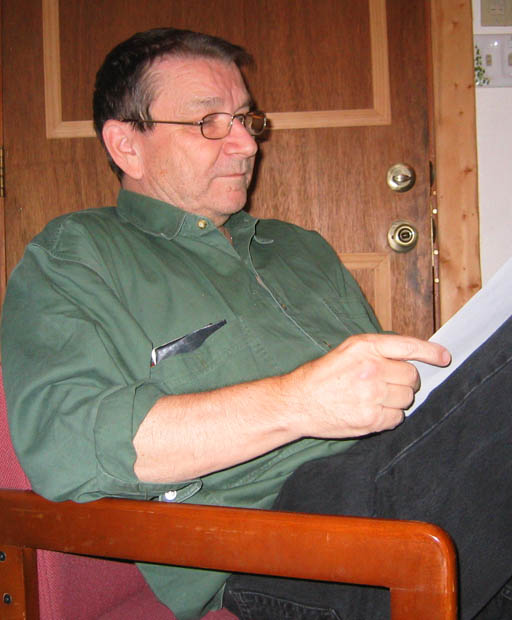Here’s Howard Waldrop— that’s MISTER National Treasure to you!— in 2006, reading someone’s submission to the Rio Hondo workshop, then held in Taos Ski Valley.
Howard died yesterday of an apparent stroke. He was 77.
I met him in the early Eighties, when I was writing the first Privateer & Gentlemen books. They hadn’t been published yet, and I was known (if I was known at all) as this guy who wrote books that no one had ever seen, which made me more obscure even than Howard. Picture that if you will.
Howard and Leigh Kennedy let me crash in their apartment in Austin on multiple occasions, which made me the guy who was so poor he freeloaded off of Howard. That’s really saying something.
Howard was a brilliant writer, of course. He invented steampunk, pretty much. (His steampunk eschewed the cliches that subsequently marred the genre.) He also invented, not alternative history, but of making a career writing alternative history. Often the steampunk and alternate history happened at the same time, often threaded with strange bits of popular culture, as in “Night of the Cooters,” which details the War of the Worlds as it took place in Pachuco County, Texas, starring Slim Pickens. (It’s now an honored short film, produced by Howard’s lifelong pal George RR Martin. Though without Slim Pickens, alas.)
For years Howard was given the final slot at Armadillocon, Austin’s SF convention. The convention wasn’t over until Howard had presented a new story, which was then deconstructed by dozens of attendees in the hotel lobby. The sources of Howard’s inspiration tended to become more recondite over the years, and the deconstruction was probably necessary for a lot of his fans..
I recall one story that features the writer Thomas Wolfe and Airman Shaw of the RAF crossing the Atlantic on a zeppelin, the whole taking place in a sort of streamlined Raymond Loewy Art Deco timeline. Knowing that Airman Shaw was an alias of Lawrence of Arabia helped with understanding, but not that much.
When I started the Rio Hondo workshop, one of my ambitions was to get Howard to participate. I knew that he couldn’t afford to come, so I brought him in as a guest speaker. I paid expenses and lodging, and he gave a talk. I offered to pay or a plane ticket, but he insisted on driving in his own car. Since I knew he drove only beaters, there was always a certain amount of suspense whether he would actually turn up, or break down twenty miles west of Muleshoe.
In addition to being a terrific writer, he turned out to be a terrific critic. I remember that he spotted the big flaw in one of my stories, expressed thus: “This problem only exists so that your characters can solve it.”
Bingo. I knew the story’s flaw perfectly well, but I was hoping no one else would notice.
Howard was also the perfect guest. He got up every morning to make coffee for everybody. He was very good at cleaning countertops and washing dishes. And of course he was wildly entertaining at all times.
His beatermobile caused problems only once, a tire with a slow leak. A week in Snow Bear’s parking lot left the tire flat, and Howard got a bicycle pump out of the trunk and set about pumping air back into the tire.
With a bicycle pump! Even if it were possible, it would have taken hours.
This tells you a lot about Howard’s ever-optimistic nature. I got my tire inflator out of my own car trunk and pumped the tire full in about two minutes,
We all got to delight in Howard’s presence for three years, before he told me he was too old to make the drive anymore. “I’ll buy you a plane ticket,” I offered again, but he didn’t bother to respond.
Poor health, aggravated no doubt by poverty, slowed him down these last years. I didn’t see him often, mainly because I stopped attending Armadillocon. (Which wasn’t Armadillocon’s fault, exactly, but the con took place in the same month as Bubonicon and Worldcon, and three in a month is too many.)
Howard is survived by a long list of publications. As he was primarily a short-story writer, most are collections of some sort, and I recommend all to you.
I’ve noticed that certain Waldrop stories speak to certain readers and not to others. Many view “The Ugly Chickens” as one of Howard’s greatest, but I was less excited by that story, and wildly enthusiastic over “Ike at the Mike.” If reading one story doesn’t ring your chimes, rest assured there will be another story in the same collection that will leave you enriched, breathless, and amaz’d.
Howard’s passing left the world a little grayer, a little sadder. But the stories are as brilliant as ever they were, and on this cold winter day I recommend reading one of his books in front of a blazing fire, and losing yourself in the wonders of the Waldropian mind.
